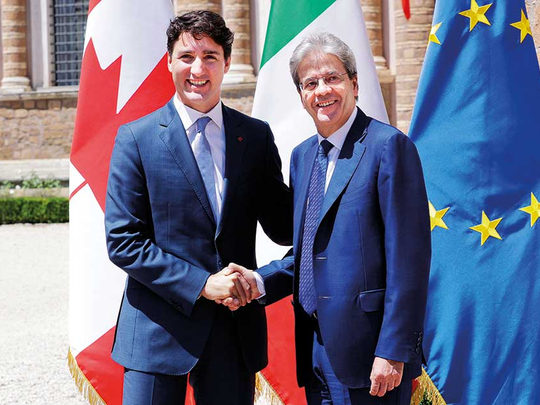
Ottawa: The Canada-EU trade agreement is “a blueprint for future ambitious trade deals” in an age of automation where job security is threatened, Prime Minister Justin Trudeau says.
Trudeau, in a speech to lawmakers and business figures in Rome, lauded the pact as a model in an era of protectionism. The speech comes as Trudeau faces a lengthy trade battle with Donald Trump over lumber, aeroplanes, steel, aluminium and the North American Free Trade Agreement.
“Leaders who think we can hide from these changes or turn back the clock are wrong,” he said Tuesday in the ornate Sala della Regina room at the Chamber of Deputies in Rome. “The pace of change has never been so fast, and yet it’ll never be this slow again.”
The trade deal, known as CETA, has what Trudeau called “unprecedented” provisions on labour protection, responsible investment, food and consumer safety, management of natural resources and environmental stewardship.
Trudeau was joined at the speech by his trade minister as Canada pushes European Union member states to ratify the trade deal as quickly as possible.
“We need to make CETA real for people,” Canada Trade Minister Francois-Philippe Champagne told reporters after the Trudeau speech. “The best way to convince those who may not be convinced is to show them the benefits” such as 9,000 tariff lines set to drop to zero when the deal is provisionally enacted, expected early this summer.
‘Twin forces’
The deal comes as automation makes traditional stable jobs more difficult to find as the “twin forces” of technology and globalisation remake the world, Trudeau said. “There are those in Canada and here in Italy who feel uncertain and anxious about what the world holds,” he said.
CETA will soon be considered by the Italian senate, Italian Senate President Pietro Grasso said in introducing Trudeau.
Trudeau lauded Italy for recognising same-sex civil unions and pushed for greater numbers of women to be elected as lawmakers or appointed to corporate boards, calling Canada’s current ratio of female Members of Parliament “not acceptable.”












